Surfacing Systemic (In)justices:
A Community View
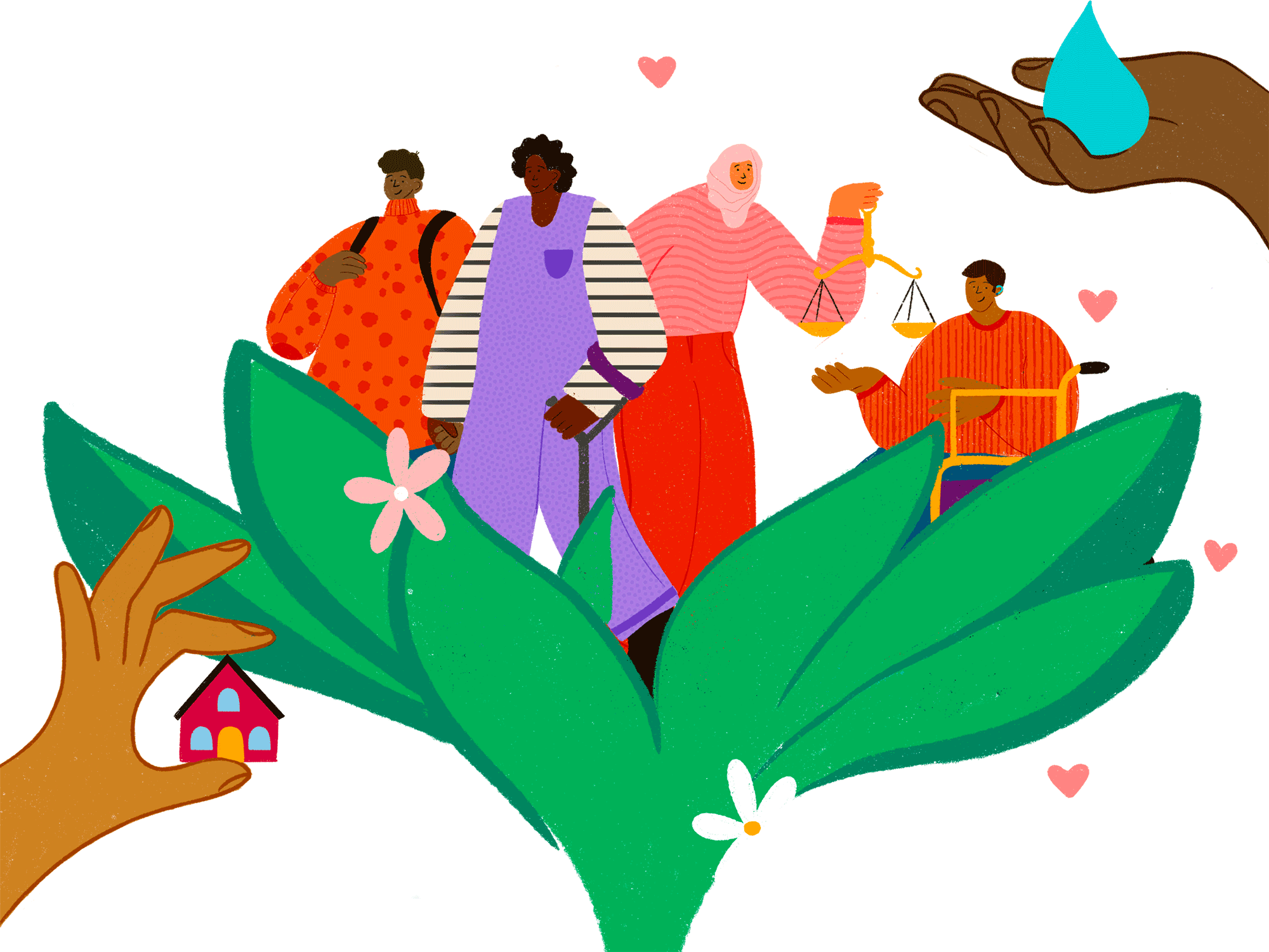
“Our battle is much more than pain and suffering. Strategic fights can make change happen that sometimes even the legal system doesn’t foresee.”
Social Protection Roundtable participant
Systemic Justice is the first Black-led, majority Black people and people of colour (BPOC) organisation in Europe working on community-driven litigation for racial, social, and economic justice.
We were established to partner with and support communities in their fights for social justice, and our vision is of a society where organisations, movements, and collectives (OMCs) can leverage the courts through strategic litigation and community-led campaigns against racial, social, and economic injustice.
Surfacing Systemic (In)justices: A Community View shares findings from an extensive Europe-wide consultation undertaken by Systemic Justice that seeks to learn from the perspectives and experiences of affected community groups and organisations, in order to inform potential litigation and other strategies for change.
Taken together, the findings in this report provide a rich and multi-layered insight into the harms of inequality and injustice across Europe.
“The change that we want to see – is that communities and movements are able to have the realistic option of using litigation as one of their tools for change, on their own terms.”
Nani Jansen Reventlow
Founder of Systemic Justice
1000+
organisations, movements, and collectives
1. A database developed by Systemic Justice of 1000+ organisations, movements and collectives (OMCs) operating across Europe, who are organising and resisting injustice alongside groups and communities affected by systemic harms.
100
respondents
2. A survey of nearly 100 OMCs, made available in English, French, German, Italian, Russian, and Spanish, distributed online by Systemic Justice and its networks.
83
participants from 33 countries
3. Six community-centred online roundtables comprising 83 participants representing 33 European countries, organised around each of the six thematic areas. The roundtables were designed to bring together and encourage collaboration between OMCs, as well as to identify opportunities for strategic litigation. Using an intersectional approach, roundtable participants working across issues, fields and disciplines provided community-centred insights into challenges and harms as contemporaneously experienced across Europe.
100
one-on-one conversations
4. One-on-one conversations with 100 individuals and representatives who are engaged with the racial, social, and economic justice ecosystem across Europe.
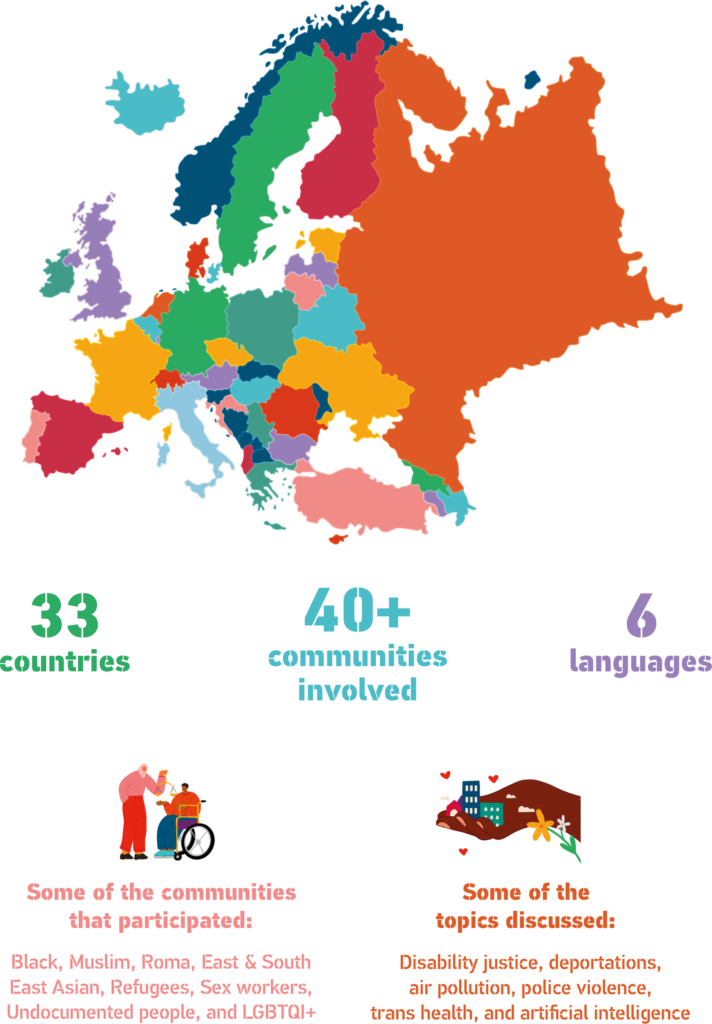
Findings
Being in close proximity to the harms of societal inequality informs in-depth and at times visceral disclosures of injustice. The rich, detailed, and granular reflections of the racial, social, and economic problems that emerged from the survey data is therefore a result of Systemic Justice’s approach to surfacing harms through centring the narratives and discourses of local communities and organisations.
Local and community OMCs contend with a series of multiple and converging themes being experienced by individuals, groups, and communities who are in close proximity to systemic harms.
A central finding here is that it is precisely those local and community OMCs with reduced capacity and resources who are under additional pressure to respond to the multiplicity of communities’ needs.
In spite of this, an overwhelming majority of organisations that responded to the survey affirmed that they would be willing to work in partnership to develop legal cases to address the systemic injustices being experienced.
The main themes emerging for support around strategic litigation are:
- There is a need for legal support, legal expertise, and lawyers.
- There is a need for support with pre-litigation research, and research generally—both the skills to do so and actual human resources.
- There is a need for support with financial and human resources in particular, but also more specific needs such as identifying claimants.
- There is a need for help with developing knowledge, education, guidance, and training (for which, as several respondents note, often there are limited financial resources). Some OMCs also mentioned a need for international data (precedents) to support cases locally.
- There is a need to know about local context before engaging in strategic litigation on issues that affect local communities.
“At the end of the day when we start talking about justice, we meet at the same point, because we all want justice for each other.”
Social Protection Roundtable participant
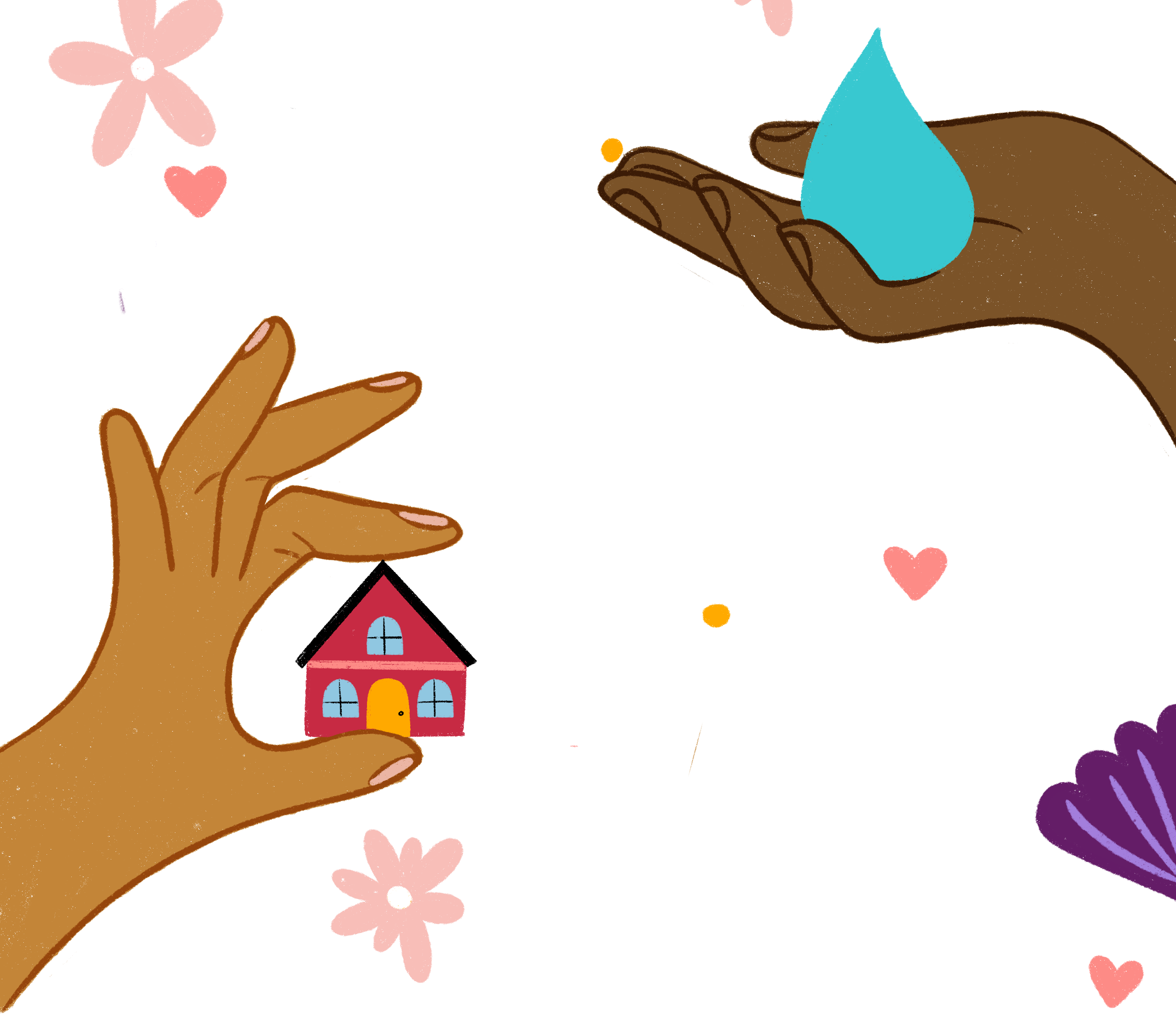
Climate Justice
Linking poverty, inequality, social justice, and the climate crisis
Key issues
- Discourses on climate must understand the connections between the climate crisis and socioeconomic inequality, disability, and race.
- Accountability must form part of our solutions to climate injustice, including redistributive reparations to address intergenerational harms through redirecting resources to communities who are most affected by the harms of climate change and other interrelated systemic injustices.
Opportunities for action
Establish a framework for redistributive reparations, redirecting resources to communities most affected by the harms of climate change and other interrelated systemic injustices.
Build legal challenges to hold institutions and corporations accountable for climate abuses that disproportionately affect marginalised groups and communities.
Disrupt the predominance of a white Eurocentric climate activism ecosystem with an intersectional approach, including by developing key messaging which recognises the systemic climate abuses and harms endured by invisibilised and socio-economically marginalised groups.
Collect evidence and raise awareness of the disproportionate health and wellbeing impacts of air, water, and soil pollution for racially, socially, and economically marginalised groups and communities.
Further demonstrate the interconnectedness of climate change with other systemic harms, paying particular attention to racism, Islamophobia, Afrophobia and anti-Blackness, as well as anti-gypsy and anti-Roma attitudes in laws and policies, alongside state violence through policing and the border regime which restricts freedom of movement.
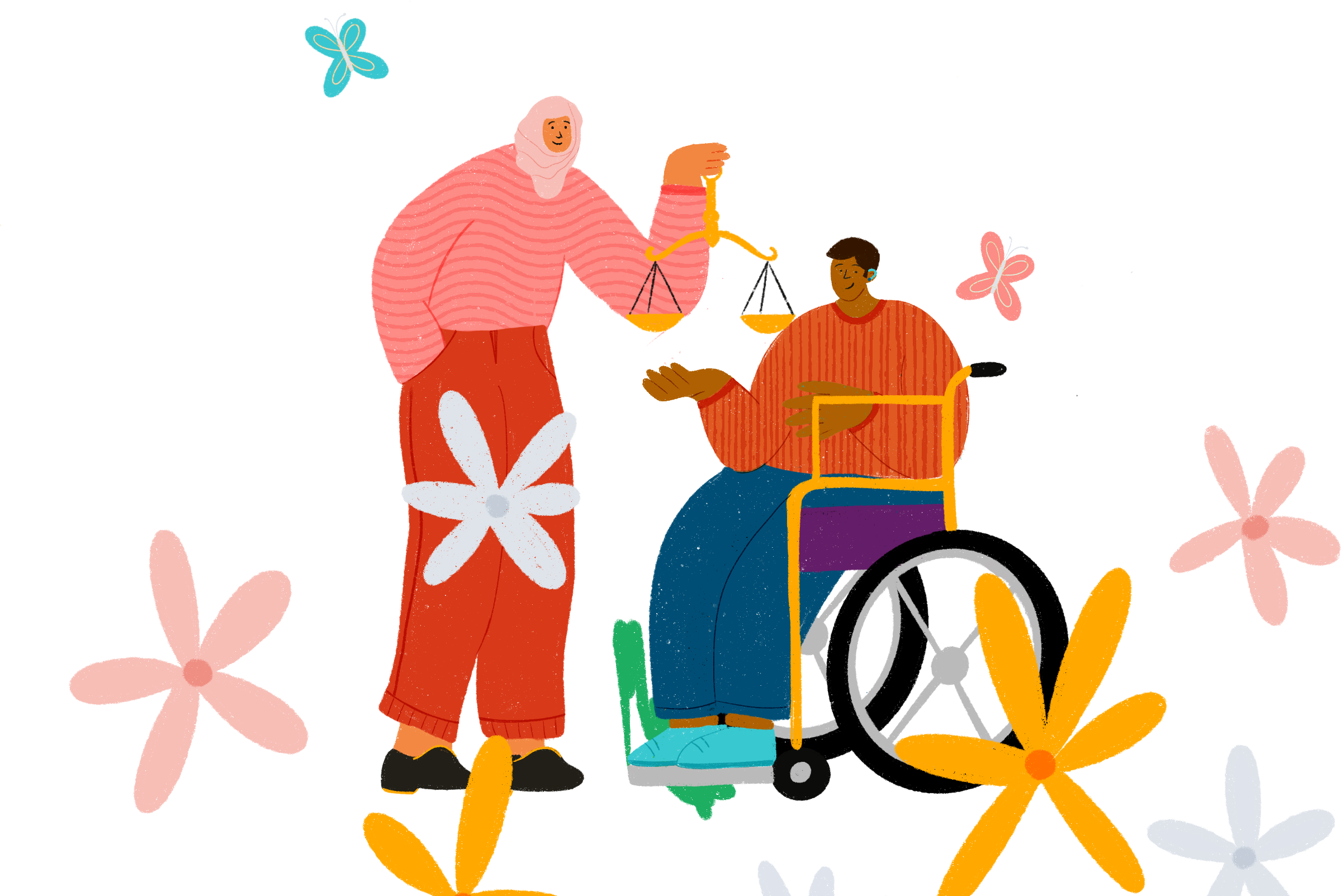
Access to Justice
Fighting for rights, responding to systemic harms
Key issues
- Alongside advocacy work and struggles for legal recognition, OMCs’ time and energy is often dedicated to immediate and pressing concerns such as access to healthcare, education, housing, and infrastructure.
- OMCs are concerned with both the absence of protective laws, and protection from laws which target, penalise, and criminalise marginalised groups.
Opportunities for action
- Develop community-led methodologies for documenting injustices experienced by racially, socially, and economically marginalised communities in order to affirm their claims of oppression and support the legal actions of local and community OMCs.
- Establish legal tactics and litigation strategies that enable local and community OMCs to pursue both rights and access to justice, while resisting reliance upon the individual claim toward a ‘human rights of the collective’, as well as avoiding pathologising and stigmatising labels (‘offender/ex-offender’, undocumented, homeless, etc.).
- Support the development of reimagined legal tactics to challenge the use of collective forms of punishment across Europe (Joint Enterprise, criminal conspiracy, etc), which target racially marginalised children and young people framed as ‘gangs’.
- Challenge the racist practice of segregating and/or excluding racially marginalised children and young people (specifically Roma) from education, which profoundly affects future opportunities and aspirations.
- Challenge European government(s) over the absence of and/or non- enforcement of anti-discrimination and anti-hate speech policies and practices, and racist crimes.
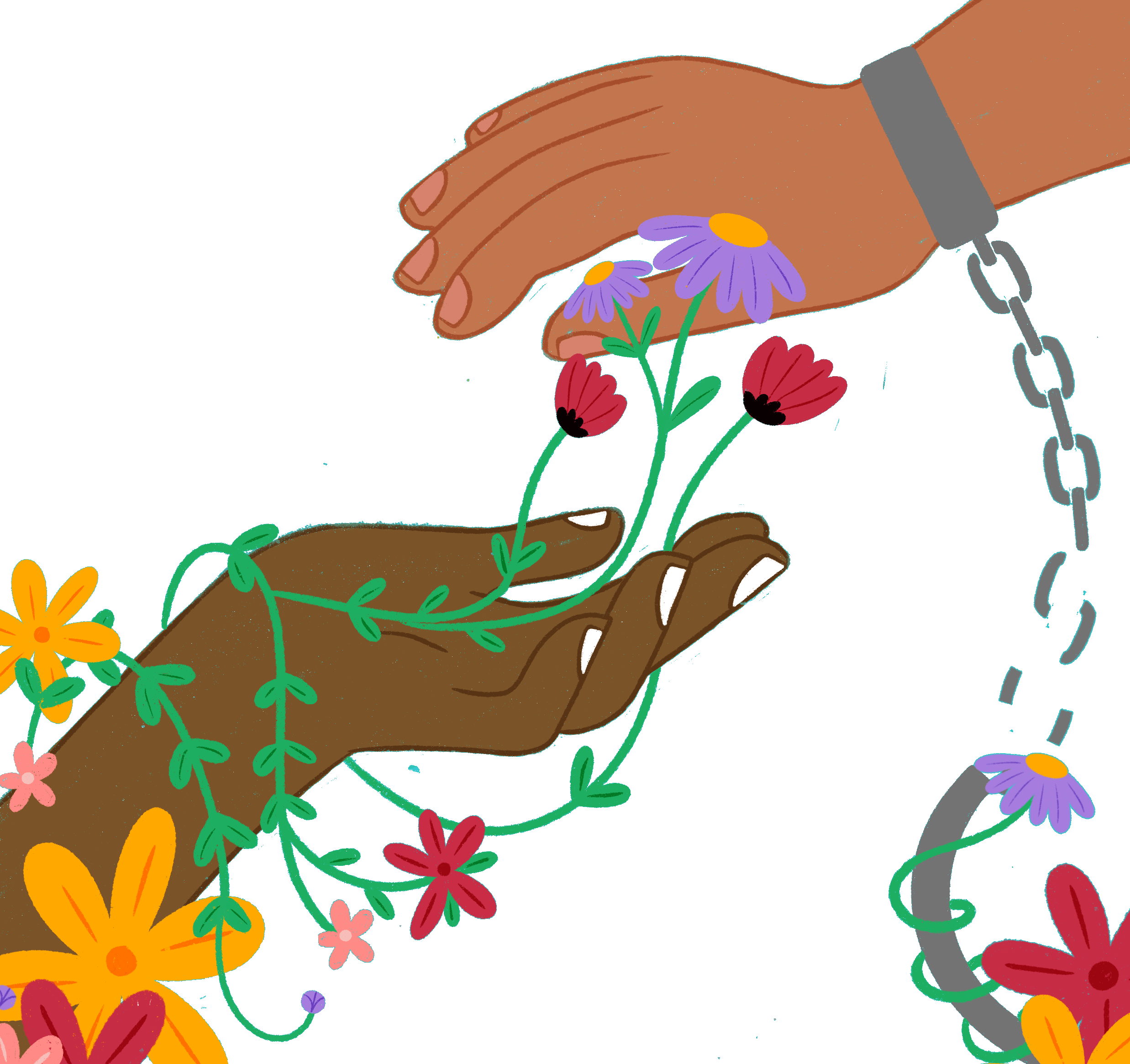
Policing
Eradicating police violence and institutional violence
Key issues
- Law enforcement targets individuals and groups who are “socially unprotected”; those who live at the site of intersecting oppressions, and in particular those whose work, immigration status, or both are criminalised. There is therefore a need to build a robust counter-narrative that makes clear the inherent harms of policing.
- The encroachment of technology, the growth of private security firms, the militarisation of policing, and fortifying of borders marks an onerous continuity of the harms of policing across Europe.
Opportunities for action
Recognise the violence of policing, including surveillance, harassment, and deaths in police custody as part of institutional oppression rooted in racism, anti-gypsyism, Islamophobia, ableism, homophobia and transphobia, and more.
Mount a legal challenge against racial and ethnic profiling by the police, and the use of stop and search—in particular its disproportionate use against those who have been institutionally abandoned and are forced into irregular activities due to social (un)protection.
Challenge the racist and criminalising drivers of over-representation and disparities across European justice systems with particular attention to disproportionate incarceration of people who are racially, socially, and economically marginalised.
Facilitate and support campaigns to decriminalise sex work across the region, with a particular focus on resisting policing of sex workers of colour and undocumented sex workers.
Build understanding of and challenges against the racist use of technology in policing and the wider criminal legal systems across Europe.

Social Protection
The institutional violence of welfare
Key issues
- Social protection is widely denied to marginalised groups, and the systems and processes that deliver or deny social protection constitute a form of dehumanising violence.
- In particular, survivors of gender-based violence, Roma communities, LGBTQI+ communities, Muslim communities, and migrant communities broadly face the violence of unequal social protection—in many cases experiencing homelessness, poverty, and institutional discrimination.
Opportunities for action
- Secure equal access to healthcare and welfare for people navigating the asylum system.
- Hold hospitals responsible for death and mistreatment resulting from institutional racism in healthcare.
- Bring together parents and guardians of children facing discrimination to challenge such practices and push for the promotion of anti-racism in educational institutions.
- Challenge exclusionary and ableist support services.
- Together with people in immigration detention and incarcerated people, campaign against law enforcement’s impunity in cases where they are challenged for specific acts or patterns of violence, which disproportionately affect marginalised groups.

Anti-racism
The legal and social fight for inclusion, safety, and justice
Key issues
- There is a need for accountability for violence perpetrated by police and other law enforcement agencies, including border enforcement, supported by independent monitoring mechanisms.
- There is a need for: awareness raising on a range of injustices, including physical demonstrations; opening up spaces where people can share lived experiences; divestment in police in order to invest in local care structures; and strategic litigation in order to attain basic rights.
Opportunities for action
- Empower local and community OMCs to campaign for European government(s)’ recognition that persistent patterns of systemic racial, social, and economic inequalities are driven by institutional racism.
- Challenge the criteria and evidence base that informs (and legitimises) the development and implementation of “ghetto zone” policies and other forms of geographical zonal regulation (such as curfews and exclusion zones).
- Campaign to extend recognition of the effects of systemic racism on emotional wellbeing and mental health for racially marginalised children and young people, and legally challenge the disproportionate levels and use of school discipline, school exclusion, and expulsions from mainstream education.
- Support growing calls for institutional funding to assist bereaved families in their pursuit of justice for victims following fatal police violence.
- Bring racial profiling to litigation; for example, bring a lawsuit to end the practice of discrimination in the labour market or welfare system, particularly with the use of AI, and more broadly empirically demonstrate and legally challenge the encroachment of technologies that compound and exacerbate the material effects of institutional racism.
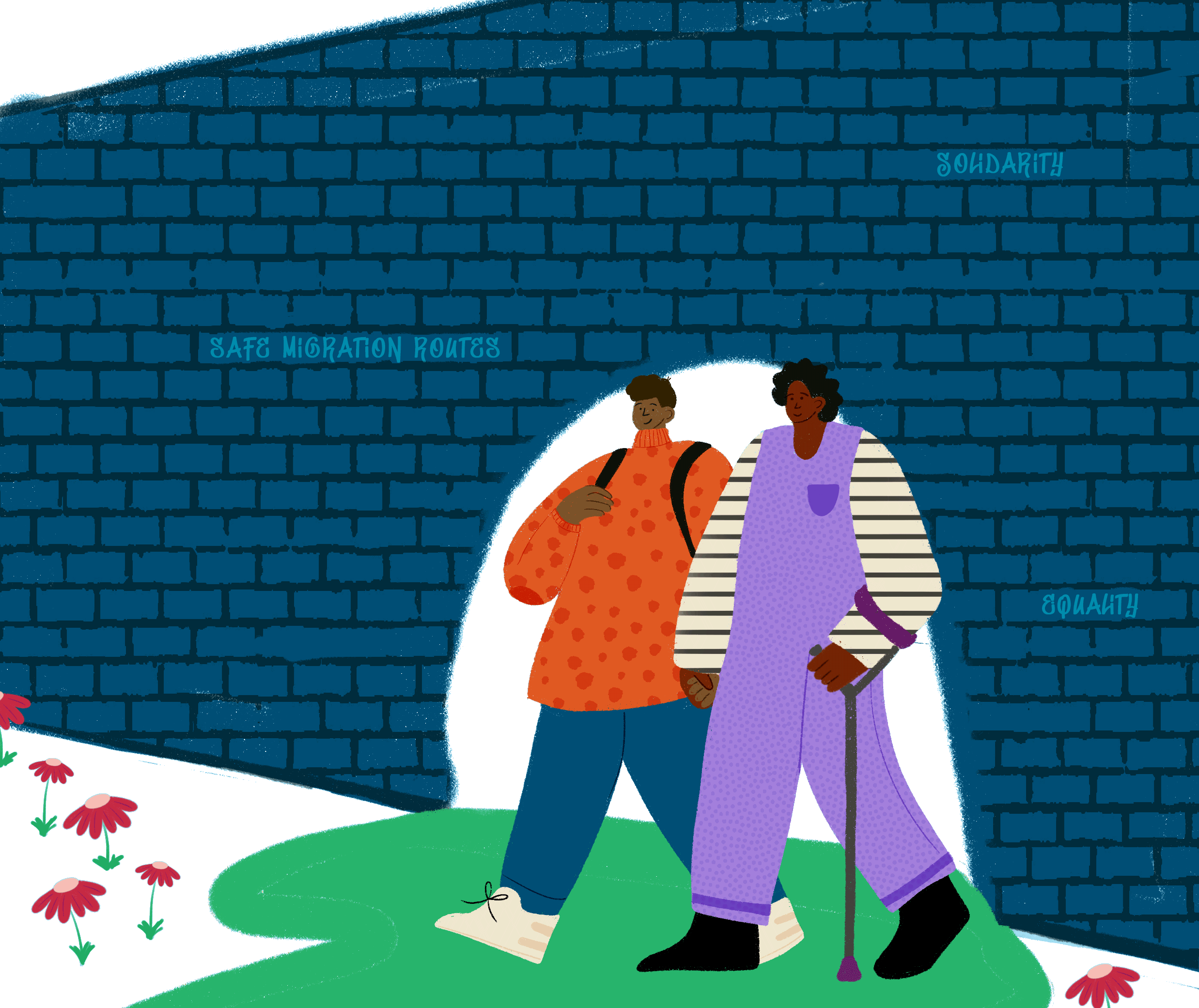
Free Movement
Systemic harms of border enforcement, immigration and asylum laws, policies, and practice
Key issues
- People migrating to and seeking asylum in Europe face discrimination and prejudice based on the intersecting identities of religion, race, ethnicity, gender, and country of origin. There is also a noted disparity between experiences of non-Europeans and European nationals both in navigating the immigration and asylum system, and in accessing social protection and the right to work upon arrival.
- Lack of awareness and knowledge of the law, as well as fear of victimisation prevents people from legally challenging their treatment by immigration and asylum systems. Where successful court rulings are secured, they are unenforced.
Opportunities for action
- Facilitate the development of a counter-narrative to reframe perceptions
of migration across Europe. This includes deconstructing ahistorical and simplistic framings of ‘economic migration’ through understanding the ‘push factor’ of economic stagnation as attributable to European interference, and in addition building appreciation of the myriad interrelated drivers for the movement of people across Europe (including climate change, wars, and other crises). - Support a campaign for the regularisation and decriminalisation of all migrants regardless of their status across European countries, and for the setting of clear timeframes for processing asylum applications.
- Advocate for legally agreed social provisions to respond to the social, health, and psychological needs of people who are seeking asylum across Europe.
- Advocate for safe migration routes and passages across Europe, and create clear lines of accountability and legal challenges for human rights violations across the migratory routes to Europe.
- Support interventions and actions by OMCs to save lives at sea (activities which are increasingly facing criminal and legal sanctions).
What's next?
This is only the beginning of Systemic Justice’s collaboration with communities in order to bring about the structural change that is needed in Europe when it comes to racial, social, and economic justice. Our community consultation was born from the intentionality of having our work be driven and led by communities; it was one piece of a large puzzle of figuring out where we should begin our work, faced with an endless range of injustices that all need to be urgently addressed.
Surfacing focus areas: climate justice and social protection
The urgent need to address injustices, and the absence of intersectional litigation work to address them has brought us to two initial areas of focus for our work: climate justice and social protection.
While the climate crisis affects us all, marginalised communities feel its effects the most. The struggle for climate justice and for racial, social, and economic justice are therefore inherently interconnected. For example, those lacking access to resilient or secure housing are the most adversely affected, as they often live in areas that are susceptible to floods and other impacts of the climate crisis. At the same time, disabled people are disproportionately affected by extreme temperatures, and people placed in polluted or toxic environments will experience illnesses that could have been avoided, and bear increased health costs as a direct consequence.
Relatedly, across Europe a pattern is emerging where social protection is being increasingly denied as a deliberate strategy to exclude groups and communities that are systemically discriminated against as ‘undeserving’ or ineligible for governmental assistance and support. These groups include people crossing borders and people seeking asylum, LGBTQI+ people, Roma communities, sex workers, members of religious groups, and more, who are blocked from accessing essential services and face barriers to health care services and labour markets. Structural efforts to challenge this approach and refocus the public debate are currently virtually absent; to help change this, we need to build litigation projects in this area together with community partners who are firmly in the driving seat.
We are deeply thankful to everyone who has engaged with us at this early stage of this journey, and excited about what American civil rights activist John Lewis described as the ‘good trouble’ we are yet to make together: the necessary disruption required for meaningful change.
We’ve only just begun.
This work is licensed under the Creative Commons Attribution Non-Commercial Share Alike
4.0 International license. Our intention is that communities who took part, and those working on these issue areas across Europe, are able to use the findings to inform their organisational work, in whatever capacity suits them. This means that this document can be copied and redistributed in any medium or format, and that it can be remixed, transformed, and built upon, provided it is for non-commercial purposes and appropriate credit is given to Systemic Justice.
If you have any questions, please contact report@systemicjustice.ngo